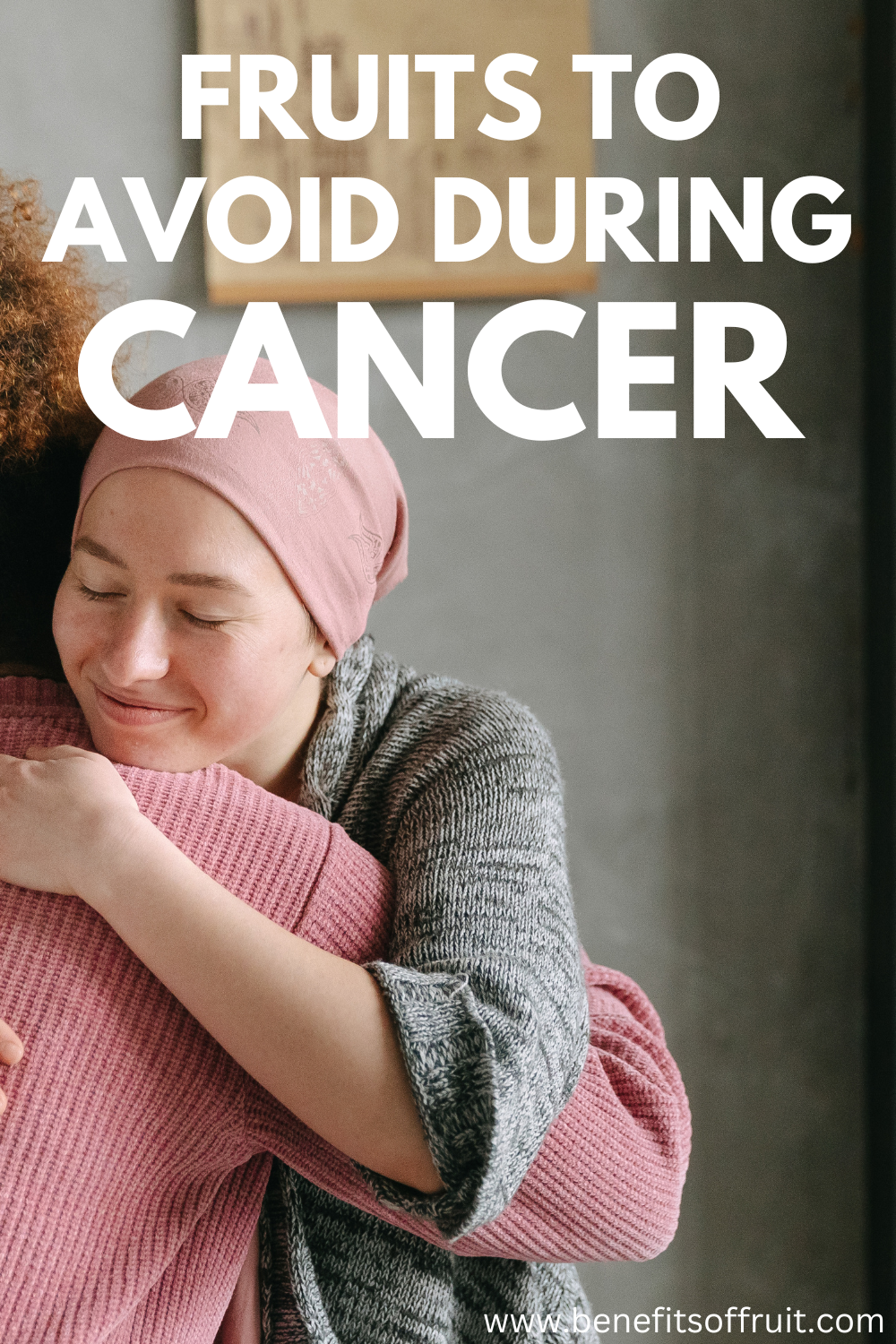Cancer brings many challenges, and one of the most crucial is maintaining a diet that supports the body’s needs while avoiding foods that might exacerbate health issues. Although fruits generally provide essential vitamins, minerals, and antioxidants, some fruits might not be suitable for people with cancer. Certain fruits can negatively impact cancer patients due to their sugar content, acidity, pesticide residues, and other properties. This article delves into which fruits to avoid during cancer and why, helping you make informed dietary choices.
Fruits to Avoid During Cancer
A. High-Sugar Fruits
High-sugar fruits can spike blood sugar levels and, in some cases, provide a source of energy for cancer cells. Maintaining balanced blood sugar levels is vital, especially for patients with hormone-sensitive cancers or those undergoing specific treatments that affect blood glucose levels.
- Grapes: Grapes contain a considerable amount of fructose, which can quickly raise blood sugar levels. While the skin and seeds offer beneficial compounds, the high sugar content can outweigh these benefits for cancer patients.
- Bananas: Bananas have a high glycemic index, meaning they can rapidly raise blood sugar levels. Although they are rich in potassium and vitamin C, patients with blood sugar management concerns should limit their consumption.
- Cherries: Although packed with antioxidants, cherries also contain high levels of fructose. Their concentrated sugars can impact blood glucose levels and potentially contribute to cancer cell growth.
B. Acidic Fruits
Acidic fruits can irritate the stomach lining and exacerbate symptoms like heartburn or acid reflux, which are common side effects of cancer treatments like chemotherapy and radiation.
- Oranges: Oranges and other citrus fruits are known for their high acidity. While they are an excellent source of vitamin C, their acidic nature can aggravate heartburn and digestive issues.
- Lemons: Lemons are extremely acidic and can further irritate conditions like acid reflux or gastrointestinal ulcers, which are common among cancer patients.
- Grapefruits: Grapefruits contain compounds that interact negatively with many medications, including those used in cancer treatment. They can interfere with drug absorption and lead to adverse effects.
C. Fruits with High Pesticide Residue
Pesticides used on non-organic fruits can burden the immune system and introduce harmful chemicals into the body. Cancer patients, who often have compromised immune systems, should be cautious of consuming fruits with high pesticide residue.
- Strawberries: Strawberries frequently rank high on the Environmental Working Group’s (EWG) “Dirty Dozen” list due to their high pesticide residue. Choosing organic strawberries is a safer option, but they still need thorough washing.
- Apples: Apples also make it to the top of the EWG’s list. Even peeling them may not remove all residues, making them potentially harmful for cancer patients unless they are organic.
D. Fruits with High Fiber Content
High fiber intake can worsen digestive issues like diarrhea, which are common side effects of cancer treatments. Certain fruits, especially those with skins and seeds, can be problematic.
- Pears: Pears are naturally high in fiber, particularly in their skin. While fiber is generally beneficial, excessive amounts can aggravate digestive issues for cancer patients.
- Apples (with skin): The fiber in apple skins can contribute to bloating or diarrhea in those with sensitive digestive systems. Peeling the apples before eating them can help, but patients with severe digestive issues may still need to avoid them.
E. Dried Fruits
Dried fruits often have concentrated sugars and may contain preservatives that can irritate the digestive system. The dehydration process increases the sugar concentration in dried fruits, making them potentially harmful for those with blood sugar management concerns.
- Raisins: Raisins are essentially dried grapes and have similarly high levels of natural sugars. Their concentrated sugar content can spike blood sugar levels quickly.
- Dried Apricots: Dried apricots often contain preservatives like sulfur dioxide, which can cause digestive issues or allergic reactions in some individuals. The dehydration process also increases the sugar content.
Nutritional Impact and Considerations
A. Impact of Avoiding Certain Fruits
Avoiding high-sugar, acidic, and pesticide-laden fruits can help maintain stable blood sugar levels, reduce gastrointestinal discomfort, and minimize the intake of harmful chemicals. However, avoiding fruits also means missing out on essential vitamins, minerals, and antioxidants. It’s crucial to replace these nutrients through other dietary sources to maintain a balanced diet.
B. Alternatives and Substitutes
Fortunately, there are many fruit alternatives that provide essential nutrients without the adverse effects associated with certain fruits.
- Blueberries: Blueberries have a low glycemic index and are rich in antioxidants. They are a great alternative to high-sugar fruits like grapes and cherries.
- Pears (without skin): Peeled pears still offer some fiber and vitamins but have a reduced fiber content, making them easier to digest.
- Kiwi: Kiwi provides a rich source of vitamin C and has a relatively low glycemic index, making it a safer choice for cancer patients with blood sugar concerns.
- Papaya: Papaya contains enzymes that aid digestion, making it a suitable fruit for cancer patients with digestive issues. It’s also low in acidity, reducing the risk of gastrointestinal irritation.
Conclusion
Navigating the world of nutrition during cancer can be challenging. Understanding which fruits to avoid and why is essential for making informed dietary choices. High-sugar fruits can disrupt blood sugar levels, while acidic fruits may exacerbate gastrointestinal symptoms. Fruits with high pesticide residues and high fiber content can also pose challenges. However, by carefully selecting suitable alternatives, cancer patients can still enjoy the nutritional benefits of fruits without compromising their health.
